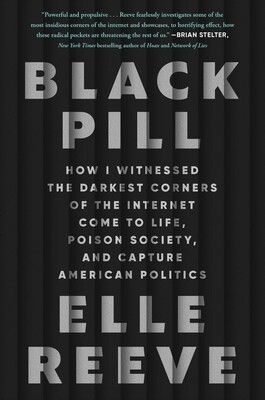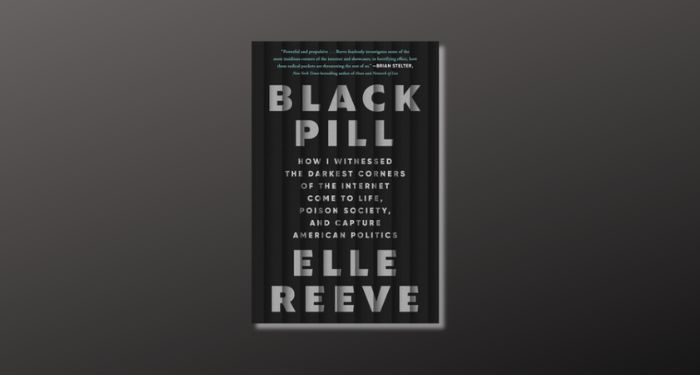This content contains affiliate links. When you buy through these links, we may earn an affiliate commission.
If you’ve been struggling to understand how we arrived here, with an insurrection in our recent past and political violence becoming almost commonplace, take an eye-opening journey with an award-winning journalist who has breached the digital and real-life spaces where hate and conspiracy coalesce. In this excerpt from Elle Reeve’s Black Pill, we meet a woman who joined a misogynistic white supremacist movement, became one of its champions, and revealed its chilling secrets.


Black Pill: How I Witnessed the Darkest Corners of the Internet Come to Life, Poison Society, and Capture American Politics by Elle Reeve
“Award-winning journalist and CNN correspondent Elle Reeve was not surprised by the insurrection at the Capitol on January 6, 2021. With years of in-depth research and on-the-ground investigative reporting under her belt, Reeve was aware of the preoccupations of the online far right and their journey from the computer to QAnon, militias, and racist groups.
At the same time, Reeve saw a parallel growth of counterforces, with citizen vigilantes using new tools and tactics to take down the far right. This ongoing battle, long fought mainly on the internet, had arrived in the real world with greater and greater frequency.
With a sharp eye for detail and a dash of dark humor, Reeve explains the origins of this shocking sweep of political violence. Drawing on countless interviews with sources in the white nationalist movement as well as hundreds of as-yet-unseen documents, she takes us on a surreal journey from the darkest corners of the internet to the most significant and chilling scenes of real-world political violence in generations. A stranger-than-fiction odyssey into the dark heart of what American politics has become, Black Pill is necessary reading for any supporter of democracy.”
In the fall of 2016, Samantha Froelich noticed her boyfriend was making jokes she didn’t understand, and when she finally Googled them, she learned they were references to the “Day of the Rope,” a blackpilled white supremacist fantasy of the day race traitors are executed and strung from lampposts. He told her he was a fascist. She was horrified. Their relationship was unhealthy, but she didn’t want it to end. She researched the alt-right. She hated the chans, but she liked the figures who seemed like intellectuals, such as Richard Spencer. On New Year’s Day, she and her boyfriend applied to Identity Evropa, the racist frat run by Nathan Damigo. Both were accepted. When the group’s women’s coordinator left, Froelich got the job. After a while, she and her boyfriend broke up, and he quit the movement. But she’d been given more authority in IE. She felt like she mattered and like she was doing something good. She stayed.
Publicly, IE tried to look “pro-white” instead of anti–everyone else. Members were supposed to look clean-cut and not use racial slurs. But it was different when no one was looking. The heart of IE was its Discord server. Once in, she got used to the “jokes,” even the ones about the Holocaust. “It starts as a joke where you laugh nervously,” she said. “Then you kind of stop laughing, because you’re used to it. And then you start to post it yourself, because you want to be a part of it.”
There were only a few women when she joined, and most of them were nerdy Gamergater types. The men made fun of them all the time, and she used that to figure out what they wanted in a woman and to build a persona around it. Her beauty icons were vintage: Anita Ekberg and Audrey Hepburn. She tried to be soft-spoken and tender and delicate. “I wanted to be more feminine, I wanted to be more desirable, I wanted to be more appreciated, I wanted to feel smart. So I just played into these roles,” she said. She learned not to start her sentences with I think we should . . . It was better to say, I wonder what it would be like if . . . She came to be known as “Helen of Goy.”
She tried not to speak too much, but she listened carefully, and overheard conversations in which men would decide who should date which woman, because this one was fertile, or because that one would be easy to redpill. “They’ll deny it forever, but for a lot of men in there, it’s insecure masculinity,” she said. They had a vision of being a strong man with a good job who could provide for his family, and do it with ease, with a fawning wife at his side. “They wanted this simple, easy life where they had the power.” She felt this weird dichotomy— what they wanted was so simple that they were easy to manipulate, but at the same time, they were dangerous, and they could lash out and hurt her.
A lot of them loved her. They noticed her pale skin and thick red hair. They’d offer advice on what to wear to flatter her figure. They helped her pick out dresses. They confided in her: “I need a wife.” They slipped into her DMs: “I just wanted to say that your hair is glorious. Hubba hubba.” She saved David Duke’s number in her phone as “Gross Old Man.”
She was tall, which, one explained to her, “makes sense for your genetic/ geographic distribution”—typical East German. Her hair was “so wild, primal, so European.” Long texts came in the middle of the night.
I know your eyes, Samantha, though you are gorgeous, I can see the stress you bear. I can feel the pain and heartache. I know your look, Samantha, because I too, was once dying.
Even after she told a guy she’d quit, and her principles were changing, he persisted: “As long as they haven’t gone so far as to accept miscegenation”
It was a cult, she thought later, after she’d fled to a cabin in the mountains. It was thrilling when she was in it, but she was horrified by what she’d done. “I spent so much of my life doing it for a story,” she said. “And now there’s this one story that I would be perfectly fine never telling.”
I wasn’t always sure whether to trust her read on things. I didn’t know if she was giving me her true read on things or her read on what I wanted her read on things to be. She was perceptive, and easy to talk to—never boring. But I got the sense that she would shift her personality to reflect whomever she was talking to, and that she thought I was a big ole boot-stomping feminist (I am).
In between our conversations, I came across the 1983 book Right-Wing Women by Andrea Dworkin, the boot-stompingest feminist of all. Dworkin had become extremely unfashionable in the era of sex-positive feminism—she was fat, frizzy-haired, and best known for saying all heterosexual sex is rape (though she never actually said it). She said porn was fascistic propa- ganda that convinced men that women liked to be abused. “I’m a radical feminist, not the fun kind,” she’d said. In 1987, Dworkin landed on Spy magazine’s list of the 100 “most annoying, alarming, and appalling people.” She ranked #15, one spot behind Nixon henchman Roy Cohn and two spots above “racism in baseball.” But after the third-ranked man on that list, Donald Trump, ascended to the presidency, Dworkin’s work began to undergo a reconsideration. I sent a PDF of Right-Wing Women to Froelich.
In that book, Dworkin argues that women’s lives are stripped of meaning
by male violence, ridicule, contempt, and refusal to believe their stories. “No one can bear to live a meaningless life,” she writes. “Women fight for mean- ing just as women fight for survival: by attaching themselves to men and the values honored by men.”
She will save herself by proving that she is loyal, obedient, useful, even fanatic in the service of the men around her. She is the happy hooker, the happy homemaker, the exemplary Christian, the pure academic, the perfect comrade, the terrorist par excellence. Whatever the values, she will embody them with a perfect fidelity. The males rarely keep their part of the bargain as she understands it: protection from male violence against her person. But the militant conformist has given so much of herself . . . that this betrayal is akin to nailing the coffin shut; the corpse is beyond caring.
Women cannot admit to being hurt by the ideals they conform to, because “to do so would mean the end of meaning itself,” she writes. “So the woman hangs on, not with the delicacy of a clinging vine, but with a tenacity incredible in its intensity, to the very persons, institutions, and values that demean her, degrade her, glorify her powerlessness.” Within the American far-right, women take the rage they feel toward the men who abuse them and project it onto whatever minority group is the current target.
Men clung to a related fiction: that whatever they were doing to women, no matter how cruel, the women actually liked it. Dworkin writes that the premature death of Marilyn Monroe raised a “haunting question” for the men who’d fantasized about her: “Was it possible, could it be, that she hadn’t liked It all along?” Conspiracy theories swirled that maybe the iconic blonde had been killed by the FBI or CIA, maybe because she’d had an affair with a Ken- nedy. The thought of an assassination was easier to bear than that Monroe was unhappy, that her smile had been fake the whole time. Dworkin writes, “Her apparent suicide stood at once as accusation and answer: no, Marilyn Monroe, the ideal sexual female, had not liked it.”
While Froelich was still figuring out what her story was, she gave her old phone from her nazi days to a journalist, and, with her permission, he gave the phone to me. Its screen was so cracked you could cut a finger swiping. I took it to a little phone store in Brooklyn, and the kid behind the counter said he could replace the screen, but there was a chance the contents would be deleted. He made me sign a waiver that promised if all the data was lost, I would accept it with dignity. But he did it—the screen unlocked, good as new, the messages preserved like a time capsule unspoiled by Wi-Fi. We high-fived. I sat down on one of the store’s dark leather couches and stared into a treasure chest until the store closed. Dworkin’s book is the only thing that has come close to explaining what I found inside.
Her phone was like an experimental novel—interwoven and contradictory narratives told out of order, significant figures concealed as pseudonyms, a slightly different Samantha in every thread. A screenshot of one conversation pasted to a third person who gave commentary on it, while back in the original chat the third person was being analyzed by the first. This is how everyone with a phone lives their life now, but you don’t really feel it until you’re digging through one that belongs to someone else. But I’m not here to offer the petty shit you’d find in anybody’s texts. What the phone reveals is two stories rolling toward horror at the same time: one on the smallest scale possible, the other a weekend of violence in a southern college town.
Excerpted from Black Pill: How I Witnessed the Darkest Corners of the Internet Come to Life, Poison Society, and Capture American Politics by Elle Reeve. Copyright © 2024. Published by Atria Books, an imprint of Simon & Schuster.

